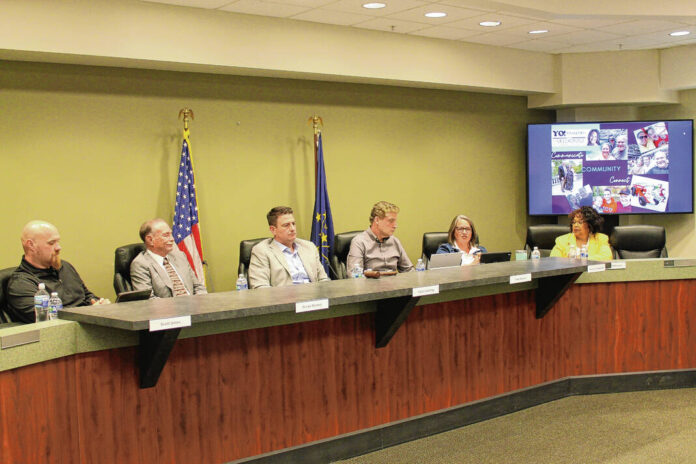
From left, McCordsville Town Council candidates Scott Jones, Bryan Burney, Chad Gooding, Tom Strayer, Andrea Yovanovich and Linda Robinson participate in a debate at McCordsville Town Hall on Tuesday, April 26.
Mitchell Kirk | Daily Reporter
McCORDSVILLE – It’s one of the few contests in Republican-heavy Hancock County so far set to have competition among the GOP and Democrats in this year’s general election.
But first the six candidates vying for two seats on McCordsville Town Council will have to get through the primary next week.
That’ll be easy for Democrats Linda Robinson and Andrea Yovanovich. There’s a four-way Republican race, however, among incumbents Chad Gooding and Tom Strayer and challengers Bryan Burney and Scott Jones.
They all gathered at McCordsville Town Hall Tuesday night to give voters a glimpse of how they’d lead should they earn the pair of at-large spots on the five-member council.
The League of Women Voters of Hancock County hosted the debate, which drew a crowd of about 30. The event was also streamed on the town of McCordsville’s Facebook page, and as of early Wednesday had nearly 500 views. The video remains available on Facebook.
One recurring theme of the debate was how the council does and should interact with constituents.
Robinson, hospitality director for the Indiana State Wrestling Association, said the current council suffers from a lack of communication and transparency.
“I believe the town council should be more visible in the community,” she said. “We need to meet people where they live and play.”
She said if she’s elected, she’d adopt that practice to inform her decisions, including about how to attract small businesses to the town.
“This should be the community’s plan,” Robinson said. “I want to listen to you, then for us to make the decisions together on what is important to our community.”
Gooding, who was caucused onto the council late last year to fill a vacancy, said he thinks the council maintains accessibility and communicates well with residents. He pointed to instances of the council rejecting residential development proposals and pressing developers on higher standards after hearing concerns from nearby Champion Lake residents.
“If you come to these meetings – communication’s amazing, the reception is amazing,” said Gooding, an Anderson native who’s lived throughout the U.S. working as a construction executive before settling in McCordsville in 2017.
But there’s room for improvement, said Burney, a retired physician who currently works as a clinical professor of radiology at Indiana University School of Medicine and owns a real estate development business. He also served on McCordsville Town Council for District 2 from 2016 through 2019.
Burney noted that the council’s once-a-month meetings often have long agendas and run late into the night. If elected, he’d push for a second monthly meeting solely for discussion between the public and council members. He also thinks the quality of meeting minutes is lacking, and would propose streaming town meetings online while making audio from them publicly available.
“The challenges are the unanswered questions,” Burney said. “What will McCordsville become? What will McCordsville look like? Where will improvements be placed? I advocate to address these challenges by reforming the town council.”
Residential development and housing was also discussed at length during the debate, something McCordsville has been no stranger to over the past several years.
Yovanovich, strategic engagement officer for CuroGens, a Carmel-based software company, expressed concerns over out-of-state investors coming into McCordsville and buying houses with cash to turn into rental properties that can result in poor upkeep and maintenance.
“We’ve got to work together as a council and a community to make sure that we work with the neighborhoods, explore opportunities to regulate these issues,” Yovanovich said. “Yes, we need rental homes. We need those properties in our community we seek to build housing, but it’s also our responsibility to work with developers to have options for all community members.”
A similar balance should be struck among price points for homes, Yovanovich also said.
Jones moved to McCordsville about eight years ago from Ohio and is a partner with an information technology company that designs networks and manages fiber optic installations. He lives in the Woodhaven neighborhood on the town’s south side, and is wary of the large industrial developments nearby along with the incentives granted to them by the town council.
Jones also has concerns over the rate at which development throughout McCordsville is occurring, including the ambitious town center project that’s just getting underway. He worries it could outpace the town’s ability to keep up services with that growth, noting it can take two years or more for taxes to be realized from new development.
“I think that if we’re growing slowly, we can absorb that cost,” he said. “But as our goal seems to be to develop every acre in the town all at once, I think that us as current residents are having to pay for it.”
Strayer, an architect who’s served on the council for 19 years and is its current president, cautioned slowing down too much risks the town’s ability to foster the growth it needs. One of those biggest needs, he continued, is pursuing an underpass beneath the railroad tracks north of Mt. Comfort Road’s intersection with Broadway, where traffic often backs up when trains pass through. That’s estimated to cost around $40 million, however, far outside McCordsville’s current financial means.
“Town center, additional growth and some of the larger commercial businesses are what are going to pay for these issues that we have right now,” Strayer said. “We can’t pay for a $40 million project without grants, without a much larger tax base than we have now, so it doesn’t make sense to slow down growth and (try to) pay for these things.”




